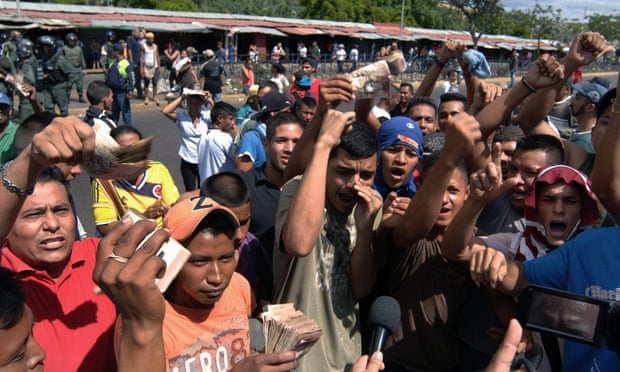
The Venezuelan government, amid looting, protests, shootings, and extremely long lines at banks, decided that its ban on the most circulated 100-bolivar note was ill-advised at this time.
The Indian government caused its own outbreak of chaos and deaths by banning 500- and 1000-rupee bank notes, worth about $7 and $14 respectively. Amid the ensuing long lines and protests, in at least 6 cases bank employees were arrested aiding their customers in the conversion of banned notes. Indians have been employing a number of workarounds to get their cash converted to the new notes, but others have been simply buying gold from vendors. The government’s response is to now push for the income-tax office’s raids on families to target not only cash holdings, but gold as well.
An article in The Economist enumerates the failures of the India demonetization initiative:
- 98% of economic transactions in India are done in cash
- Four-fifths of India’s workers are paid in cash
- Estimates of annual GDP growth now include a 2% decline due to payments drag
- The new notes are smaller and only a subset of ATMs can handle them
- $22 billion in notes are to be replaced; only $3 billion worth can be printed per month
- The flood of deposits into banks were used to buy bonds, depressing interest rates
The cash ban has also caused a diplomatic row, as a flight to the safety of US dollar notes and the ensuing shortage of dollars has left Pakistan unable to pay its diplomatic staff in India.
Turning a blind eye to the chaos in other countries that are banning their own citizens’ cash, the head of the Australian tax office suggested banning the Australian $100 note in an explicitly stated attempt to raise tax revenue. Earlier in the year, a surprise $34 billion increase in the Australian budget deficit over four years had been acknowledged.
Developed-world governments are joining their developing-world counterparts in governing by surprise and openly placing their citizens’ wealth at risk through anti-cash messaging and actions.
The stated reasons usually range from fighting the drug black market (created by global drug prohibition) to fighting terrorists (often created, funded, and armed by developed-world governments) to fighting tax avoidance, which could be fought more effectively by lowering tax rates and eliminating burdensome paperwork and reporting requirements.
However, regardless of the stated reasons, the underlying motivation is to move cash-based activity into banks. This benefits the global ruling class in several ways.
The banks and other financial middlemen win, because every transaction will subsequently have fees attached.
After all, depositors at a bank are no longer the bank’s true customers, thanks to privileged credit facilities at the central bank, state-sponsored deposit and loan guarantees, and myriad banking regulations erecting barriers to entry and thereby fostering consolidation of bank ownership. Banks can survive without customers’ deposits, thanks to state backing, but they cannot survive without regulatory compliance. In the cashless society, the banks will have an army of new unwilling customers from whom to extract fees, without being subject to the otherwise countervailing market force of consumer choice.
And the state wins, because all depositors’ economic activity is transparent to it through its control over the banks, making tax collection more thorough and dragnet surveillance more comprehensive. The state can also, through its control over the banks, order accounts frozen at will. This could prevent, for example, a defendant in a government action from retaining a specialist lawyer that could mount an effective defense, which wouldn’t be a problem if he had cash.
Other than control, the state can directly profit from cash bans: notes that are not turned in can be cancelled and converted into a ‘fiscal stimulus’ windfall for the state, a strategy openly floated during India’s cash ban.
Workers and savers lose; who else loses? As a Telegraph article describes, a cashless society would be a nightmare for the homeless, who generally do not possess the proper paperwork to satisfy the state’s requirements to open a bank account. Suddenly the class warfare inherent in cash bans comes into focus, and not in a way that was expected.
As The Economist states:
India is not the first country to introduce abrupt, drastic reform of its currency. But the precedents—including Burma in 1987, the former Soviet Union in 1991 and North Korea in 2009—are not encouraging. Burma erupted in revolt, the Soviet Union disintegrated and North Koreans went hungry.
Governments that now seek to ban cash in partnership with banks should consider whether they wish to be in the company of the above countries, whether in their motivation or in the outcome.









